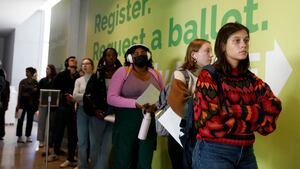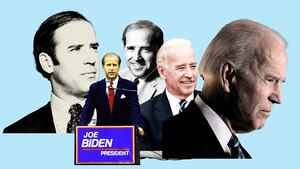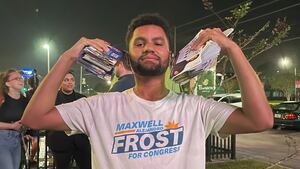If he wins, Joe Vogel wouldn’t technically be the youngest member of Congress.
That honor would still go to Rep. Maxwell Frost (D–FL), the activist and organizer from central Florida who became Gen Z’s first voice on Capitol Hill with his victory in 2022. But as 2024 rolls around, Vogel—a state delegate in Maryland five months into the job—has positioned himself as one of the first viable Gen Z candidates to try and follow in Frost’s footsteps.
The 26-year-old is running for Maryland’s 6th Congressional District, which spans from the Washington, D.C., suburbs in the east to the western tip of the state’s panhandle. And while voters may think of his age as a liability, Vogel sees it as a strength.
Candidates like him, he contends, can help bring young voters who have overwhelmingly supported Democrats back to the polls and ameliorate their fears about an aging president. (Joe Biden will be just a few weeks short of turning 82 when he next appears on a general election ballot.)
“We have a problem in our politics,” Vogel told The Daily Beast during a recent interview. “We are missing a generation of leaders, and missing our voices at the table.”
A gay, Jewish, Latino immigrant from Uruguay, Vogel claims a personal stake in the issues he’s running on. And unlike Frost’s direct pivot from organizer to representative, Vogel’s path to seeking the Democratic nomination for Congress has required him to climb the political ladder.
At 26, Vogel has been campaigning for Democrats since his teens, starting nearly a decade before he launched his own successful statehouse bid.
He translated that campaign experience into a victory once—and he thinks he can do it again.
“When I ran for delegate, we built a campaign driven by young people,” Vogel said. “We’re building the same sort of campaign here.”
Vogel’s platform includes standard left-wing priorities: strong support for LGBTQ rights, addressing climate change, fighting right-wing extremism, and other progressive wish-list items. His age—as well as his legislative wins during his short stint in the statehouse—are what set him apart in a growing primary field, he contended.
A self-styled “pragmatic progressive,” Vogel has already earned a reputation among his colleagues as a methodical and ambitious legislator.
At a glance, Vogel’s biography tracks closely with Frost’s. Both are 26—born just weeks apart—with immigrant parents. Both became politically involved as teenagers, volunteering in Barack Obama’s re-election campaign. Both became active in the student-led gun control movement after the Sandy Hook school shooting.
But Vogel represents a far more conventional candidate than Frost, who didn’t have a college degree or legislative experience when he took office. Vogel, by comparison, enters the race with a Master’s degree from Harvard, established connections in Washington, and a five-month crash course in legislating under his belt.
His career began about 20 miles from the Capitol, in an immigrant-friendly enclave of Rockville, Maryland, that Vogel referred to as “the United Nations of children.” He ended up in Rockville when he was just 3 years old, transplanted in part by his father’s work with the International Monetary Fund.
There was a point he thought of becoming a doctor. But after taking his first step into politics with the Obama campaign, Vogel never looked back. He later campaigned for a state Senate candidate with a strong gun control platform before joining Hillary Clinton’s 2016 staff.
Vogel, then an undergraduate at George Washington University, briefly ditched school to travel across the country with the Clinton presidential campaign. He was even with her team in New York City when Clinton’s loss—and Donald Trump’s win—became official.
The defeat hit Vogel hard.
“He was just an attack on all the values and everything that I cherished about this country,” Vogel said. “It was four years of chaos and division and so much hatred, in particular for so many of the communities I’m a part of.”
After the loss, Vogel went back to school. He officially got his U.S. citizenship about a week later.
Vogel joined more Democratic campaigns in the years that followed, including former Virginia Gov. Ralph Northam’s 2017 bid. In the 2020 Democratic primary, he worked first for Sen. Cory Booker—who he would come to see as his political idol—before signing on with former New York City Mayor Michael Bloomberg when Booker’s campaign folded.
After almost a decade campaigning for others, Vogel said he grew frustrated with what he saw as inaction by elected leaders.
“There were a lot of people who were in power just for the sake of being in power, but on many of these issues were just sitting on their hands and doing nothing,” Vogel said. He decided to run for himself.
An opportunity sprung up when the same state senator Vogel campaigned for in 2014 encouraged him to mount a primary challenge against an incumbent delegate. When that incumbent retired, Vogel ended up winning the general election, becoming one of two members of Maryland’s inaugural class of Gen Z lawmakers.
Once in office, he got off to an early start, sponsoring a flurry of legislation on his key issues.
“The typical newly elected official is going to just try to get the lay of the land, figure things out, and then get involved,” said Kevin Hornberger, a Republican who serves with Vogel on the House of Delegates education subcommittee. “Joe was one of these people where, on day one, he's mixing it up.”
Hornberger and Kris Fair, another of Vogel’s colleagues in the statehouse, described him as someone who will stake out hardline positions, but who is willing to compromise on points behind closed doors.
Vogel struck Fair as a strong candidate when they first met on the campaign trail. Now, the two work closely on LGBTQ issues in the education subcommittee. When one of them defends a bill on the statehouse floor, Fair said they’ll often meet to exchange notes and bounce ideas off each other.
“Joe was always willing to sit down and practice and work through these ideas together,” Fair said. “If we had a discussion where we weren’t quite in alignment with each other, we would always go back to the table and try to discuss again and again and again.”
In his first few months in Annapolis, the freshman delegate’s legislative wins have included bills mandating fentanyl screenings in hospitals and establishing a statewide commission to report on hate crimes.
He credits those early successes to his political philosophy, one he describes as rooted in realism about “the constraints of government.”
“I’m a progressive, but I’m also a progressive who wants to deliver,” Vogel said. “We can have these bold ideas and this bold, progressive vision for the future, but if we’re not getting anything done for people, it doesn’t matter.”
But less than a year into that statehouse career—which he insists he loves—Vogel is ready to move on.
Hornberger said that Vogel’s campaign announcement was met with skepticism from state lawmakers who think “he’s taking a very accelerated pathway.” But Vogel doesn’t see it that way.
“I actually see this as doubling down on the commitment that I’ve made,” he told The Daily Beast.
He said the same motive that pushed him to campaign for delegate is now leading him to seek a seat in Congress: a frustration with the status quo.
Vogel also feels personally invested in fighting the rise of “far-right authoritarianism” on the national stage. His great-grandparents fled fascism in Eastern Europe, and his parents and grandparents lived under a military dictatorship in Uruguay.
“I am one of the strongest voices standing up and saying no and fighting back,” Vogel said, citing Trump and Florida Gov. Ron DeSantis as examples. “I’m so deeply committed, passionately committed about protecting our democracy, because I know what lies on the other side of that.”
But Vogel, who studied the collapse of Uruguayan democracy in college, believes Congress also needs to restore disillusioned young Americans' “faith in democratic governance.” The body needs to prove that the government can still improve their situation, he said.
For him, that means being open to working with just about anybody—even the same lawmakers he accuses of undermining the country’s democratic institutions.
Vogel argued that a key aspect of his candidacy would be restoring young Americans’ trust in democracy. And one of the ways he wants to do that is by putting another Gen Z candidate in office.
Vogel still supports Biden and believes the benefits of the president’s policies outweigh any concerns about his age. Still, he sees the prevailing gerontocracy in Washington, D.C., as an obstacle to engaging young voters.
“One evidence-based way to drive up youth turnout in an election is to put young people on the ballot,” Vogel said. “We bring a greater sense of urgency to many of these challenges that we face, and I think we need that urgency. We need those voices.”
Vogel was the first Democratic candidate to declare his candidacy in the blue-leaning 6th District. Democrat David Trone, who is now campaigning for an open Senate seat, carried the district by roughly 10 points in 2022—putting the Democratic nominee who replaces him in a strong position for the general election.
Vogel has leaned into his youth in his early messaging, proudly branding himself as a Gen Z candidate. His campaign launch ad, which is set in a high school, makes his pitch directly to young voters.
As students in the ad watch footage of the Jan. 6 insurrection and hide during an active-shooter drill, Vogel lays out his platform as a series of threats facing the next generation.
He appears on screen dressed like a young teacher, leaning on a desk as he rattles off his résumé. He tears into a brand of Republican politics that “forces you to become a parent before you’re ready,” and that tells students “what books you can read, and what gender you are, and who you can love.”
But Vogel’s path to the nomination—and a likely Democrat-friendly general election—has become more fraught since that early launch.
Other Democrats, including an older, more experienced lawmaker in Annapolis, have since jumped into the race. Lesley Lopez, a delegate since 2018 who recently led the Maryland Women’s Legislative Caucus, joined on June 1 on an anti-gun violence, pro-abortion rights platform. Mia Mason, a veteran and trans woman who in 2020 ran for Maryland’s 1st Congressional District, put her name in less than a week later.
Still, Vogel is working with a head start on campaigning and fundraising, something Fair said could work to his advantage.
“Joe’s doing an amazing job of getting out there early, talking to voters now, and defining himself, and also potentially defining what the campaign issues will be,” Fair said. “He sees a message and a moment where he feels he needs to step into this role.”
In his launch ad, Vogel dismissed the concerns of political insiders who “say I should wait my turn.” He falls back on a word he uses often to describe his approach to politics: urgency.
“When I go out into the community, when I go out into the district, no one is asking me about how long I’ve been in office,” he told The Daily Beast. “They know what I’ve been able to accomplish.”










